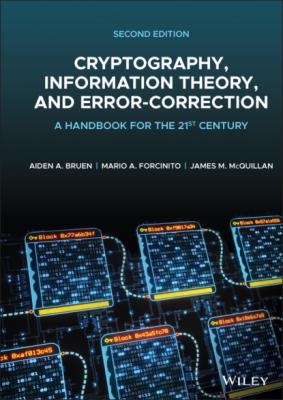Cryptography, Information Theory, and Error-Correction. Aiden A. Bruen
Читать онлайн.| Название | Cryptography, Information Theory, and Error-Correction |
|---|---|
| Автор произведения | Aiden A. Bruen |
| Жанр | Зарубежная компьютерная литература |
| Серия | |
| Издательство | Зарубежная компьютерная литература |
| Год выпуска | 0 |
| isbn | 9781119582403 |
Bob puts the numbers
Now, Alice has a secret message
When Bob receives
Let us formalize the procedure.
The RSA Algorithm.
1 Bob chooses in secret two large primes with and sets .
2 Bob chooses bigger than 1 with relatively prime to and to , and with .
3 Bob calculates the decryption index , where is such that the remainder of on division by is 1. More generally, Bob calculates a decryption index , where is such that the remainder of on division by is 1. Here, is any number divisible by both and .
4 Bob announces his public key and keeps his private key secret.
5 Alice wishes to send a secret message and represents as a number between 0 and . Alice then encrypts the message as the remainder of upon division by and transmits to Bob.
6 Bob decrypts by calculating the remainder of upon division by : this gives the original secret message .
Remark 3.2
If
Remark 3.3
It is beneficial for Bob to also store
